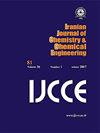Methane dehydroaromatization over Mo and W catalysts supported on ZSM-5
IF 1
4区 工程技术
Q4 CHEMISTRY, MULTIDISCIPLINARY
Iranian Journal of Chemistry & Chemical Engineering-international English Edition
Pub Date : 2021-09-06
DOI:10.30492/IJCCE.2021.529951.4720
引用次数: 0
Abstract
Methane aromatization reaction to produce benzene using tungsten and molybdenum catalysts supported on ZSM-5 was investigated at 800 oC. Catalysts were prepared by impregnation of tungsten and molybdenum salts on ZSM-5 zeolite with various metal loadings in the range of 2-10 wt. %. In order to obtain the catalytic structures before and after the reaction, catalysts were characterized by XRD and FTIR analysis. It was indicated from reactor tests that increase of metal loading on the catalyst surface leads to increase methane conversion (1.1% and 3.2% for 2W/ZSM-5 and 6 W/ZSM-5, and 2.4% and 4.8% for 2W/ZSM-5 and 6 W/ZSM-5, respectively, at time of stream equals 120 min). It was also concluded that Mo catalysts show higher activity and stability than W (methane conversion of 3.2 and 9 % using 10Mo/ ZSM-5 and 10 W/ZSM-5 catalysts respectively, at time of stream equals 100 min), and increase of Mo loading leads to enhancement of catalytic activity and methane conversion, which indicate initial activation of methane is occurred on metal sites of catalysts. This activation leads to occur the later reactions and production of final benzene. These conditions confirm the two-factor mechanism which include two stages: i) hemolysis break of C-H bond and CH3 radical formation and then ethylene formation, and ii) cyclization of ethylene species in the presence of acidic sites within the zeolite channels. Investigations on mesoporous HMS support showed no aromatic production, which show increase of support channel diameter leads to reduce the possibility of ring formation.ZSM-5负载型Mo和W催化剂的甲烷脱氢芳构化反应
在800℃条件下,以ZSM-5为载体,采用钨钼催化剂对甲烷芳构化制苯进行了研究。通过在ZSM-5沸石上浸渍钨钼盐制备催化剂,其金属负荷量在2-10 wt. %之间。为了得到反应前后的催化结构,对催化剂进行了XRD和FTIR分析表征。反应器试验结果表明,增加催化剂表面金属负载可提高甲烷转化率(2W/ZSM-5和6w /ZSM-5在流程为120 min时,甲烷转化率分别为1.1%和3.2%,2W/ZSM-5和6w /ZSM-5分别为2.4%和4.8%)。Mo催化剂表现出比W催化剂更高的活性和稳定性(10Mo/ ZSM-5和10w /ZSM-5催化剂的甲烷转化率分别为3.2%和9%,反应时间为100 min), Mo负载的增加导致催化活性和甲烷转化率的提高,这表明甲烷的初始活化发生在催化剂的金属位点上。这种活化导致了后期反应的发生和最终苯的产生。这些条件证实了两因素机制,包括两个阶段:i)溶血破坏C-H键,形成CH3自由基,然后形成乙烯;ii)在沸石通道内酸性位点存在的情况下乙烯类环化。对介孔HMS载体的研究表明,HMS载体没有产生芳香烃,这表明载体通道直径的增加导致环的形成可能性降低。
本文章由计算机程序翻译,如有差异,请以英文原文为准。
求助全文
约1分钟内获得全文
求助全文
来源期刊

Iranian Journal of Chemistry & Chemical Engineering-international English Edition
CHEMISTRY, MULTIDISCIPLINARY-ENGINEERING, CHEMICAL
CiteScore
2.80
自引率
22.20%
发文量
0
审稿时长
6-12 weeks
期刊介绍:
The aim of the Iranian Journal of Chemistry and Chemical Engineering is to foster the growth of educational, scientific and Industrial Research activities among chemists and chemical engineers and to provide a medium for mutual communication and relations between Iranian academia and the industry on the one hand, and the world the scientific community on the other.
 求助内容:
求助内容: 应助结果提醒方式:
应助结果提醒方式:


